Everyone loves a picnic, but cold sandwiches and leftover chicken can only be so much fun. Show up to a tailgate party with egg salad, and everyone laughs you out of the stadium. Portable gas grills are perfect for your outdoor parties! Get ready to rock the brats, make heavenly hamburgers, and grill the goodies!
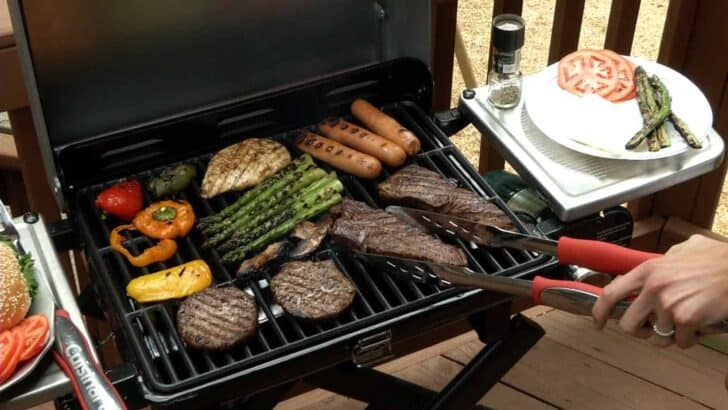
Don’t let those shiny surfaces and slick salespersons steer you away from our Top Portable Gas Grills!
But if you’ve ever walked down the barbecue aisle at a home center, or worse, go to an outdoor kitchen-specific store, the choices become overwhelming. Plus, who can resist the dream kitchen with a grill big enough to cook a side of beef with the shining chrome and stainless steel gleaming under the halogens? Some of those prices are worthy of smelling salts. However, most portable grills are under 300 bucks, and we’ve found several less than $150.00 that have good reviews!
Table of Contents
How to choose your portable gas grill?
The portable natural gas grill is distinguished by its ease of use and its efficiency. Allowing to roast, fry or even cook, it is very compact and can be stored or moved easily.
Because there’s no way to own all of them and test them out on a website administrator’s paycheck, we utilized several great resource sites. Additionally, we checked out Amazon ratings and read numerous reviews for the good, bad, and the ugly on the grills we’ll discuss.
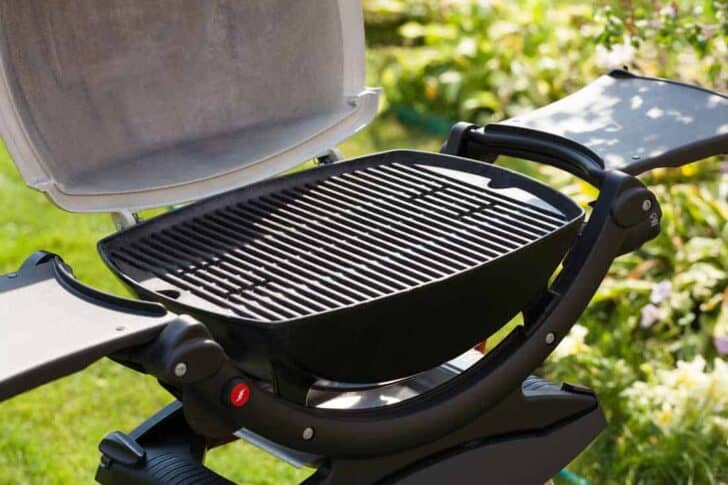
How does a portable natural gas grill work?
Popular with ease of use, the portable natural gas grill is made of enameled steel or stainless steel. In principle, it works in the same way as a conventional gas grill. The apparatus consists of a cylinder of gas (butane or propane), a pipe, one or more burners, a grating that supports lava stones and a plate or grill Cooking. When in use, when the barbecue is turned on, the gas is burnt by the burner. It then diffuses the heat to the lava stones, the grill or the plate.
For cooking, simply place food over the plate or grill. That said, the portable gas grill can be paired with a lid that makes it possible to have an effect four. It can also include accessories such as a plancha, rotisserie or other to promote other cooking methods.
- 14" Enameled steel cooking grate: the 14” porcelain Enamel cooking grate gives a spacious cooking surface and is dishwasher safe, making cleaning The grates a breeze Use after use.
- 10, 000 BTU burner works with 1 lb Propane tank: features a 10, 000 BTU burner, a push to Ignite start button, and is compatible with a 1 lb. Propane tank giving you ultimate portability.
What are the different types of portable natural gas grills?
There are 3 main types of portable gas barbecue:
- Portable gas grill
- Gas grill on wheels
- Foldable gas grill
The portable gas grill is an extremely simple outdoor grill model. It is mounted on 3 or 4 feet of a height of about 40 or 50 cm. It may or may not include handles. But in any case, its transport is very simple because of its compact size and its lightness. This type of barbecue is suitable for all situations because it is possible that the installer is everywhere, whether directly on the ground, on stable support or even in the camper itself.
The barbecue on wheels, known as a mobile gas grill, generally includes 4 feet, 2 of which are provided with rollers. These are provided to facilitate the movement. For example, the two legs that do not have castors must be raised and then shoot or push the barbecue to transport it. Very practical, this type of device is rather intended for use on the flat and stable surface.
The foldable gas grill for its part can be folded or unfolded easily. A handle is associated with it to simplify its transport. Very compact, it can perfectly be used on any surface: camping, wilderness, balcony, etc.
- This Natural Gas Grill requires an existing natural gas connection and cannot be hooked to a propane tank.
- Two stainless steel burners produces 21,700 BTU-per-hour to heat 393 square-inch total cooking area
The benefits of the portable gas grill
The fact that the portable gas grill is movable is already a major advantage. Indeed, it allows us to take it anywhere. But in addition, this type of device also displays other advantages. Unlike the electric grill and the charcoal grill, it is very simple to light. It only takes a few minutes to heat its grids or to allow its lava stones to diffuse the heat.
With its various accessories, it is considered as a multifunctional equipment. This can be used to roast meat, cook food or serve as an oven. Operating on gas and being transportable, it is entirely autonomous. It does not require any additional connection to operate.
Finally, during the firing process, absolute temperature control is maintained. It is possible to adjust the intensity of the fire, depending on the type of cooking, by adjusting the burners.
The criteria to consider in favor of better cooking
Some points are to watch on the portable gas grill before you buy it. First, it is important to choose a model with an adequate number of burners. A barbecue with 1 burner certainly consumes less gas, but it implies a good mastery of cooking. It is often used for slow cooking. A BBQ with 2 burners is more efficient, as the food cooks properly. A barbecue with 3 or 4 burners is to be preferred for a very uniform cooking.
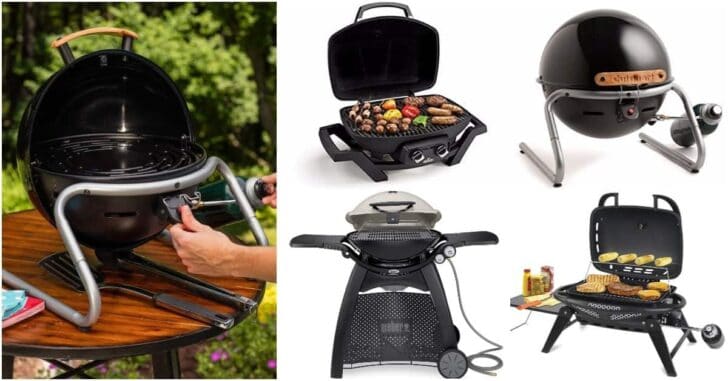
Having said that, one must be careful when cooking to prevent the food from drying out. In addition, the shape of the burner is also to be taken into account. One can find models in the form of serpentine, shaped in 8, H-shaped, and in the form of horizontal bars. For better cooking efficiency, it is suggested to choose the coil-shaped or 8-shaped burners.
Secondly, the cooking surface must be given a lot of importance. To ensure that the grill does not lose its usefulness, it is best to check that there are the main grill and a plancha.
Third, the presence of a grease trap should be checked. Regardless of the type of gas-fired portable gas grill chosen, the latter is an indispensable element for healthy cooking. This is a tray where the grease from the cooking process flows out. As a result, fats are unlikely to spill on the fireplace and cause toxic and smelly fumes. In addition, the grease tray greatly simplifies the maintenance of the barbecue since there is no grease that accumulates on the fireplace.
Lastly, it is essential to consider the power of the barbecue. A non-negligible element, the latter determines the consumption of the device. The ideal consumption would be around 10 and 18 kWh.
The other parameters for choosing a portable gas grill
In order for the portable gas grill to be perfectly efficient, certain points must be checked. In this sense, a model with an enameled tank is more practical, because it promotes a good diffusion of heat by convection. This is very effective in optimizing gas consumption. Since rust is toxic, it must also be ensured that the entire grill is made of stainless steel.
Since the barbecue is often used in campsites, it is necessary to emphasize the solidity of the chassis. The feet and supports of the appliance must be stable and strong. They should not be able to wobble easily.
In terms of convenience, it is necessary to check the ignition system. Therefore, it should preferably be electric and operate in the same manner as a lighter. The quality of the ignition button is also essential. It is best to choose a model with a button made of solid material that does not break easily.
Before you buy one of the top portable gas grills, you need to do your research first. Here is a list of questions you should answer before walking into the store:
- What fuel source is best for the way I want to cook?
- What’s your budget? Don’t go into massive debt because of the sales pitch!
- How often will you use the barbecue throughout the year?
- What features do you need on your grill?
- How many people will you typically serve each time you grill?
- Do you need a unit that stays in one place (like an outdoor kitchen), or do you want one that you can transport for camping, tailgating, and parties?
- How long do you expect your grill to last – like will a disposable, charcoal-fired one meet your needs, or are you a camping-master?
Did you know that grills come in four fuel types? The fuel types include Propane/Natural Gas, Electric, Charcoal, and Pellets. If you’d like to learn more about the types available, we describe the fuels at the end of this article.
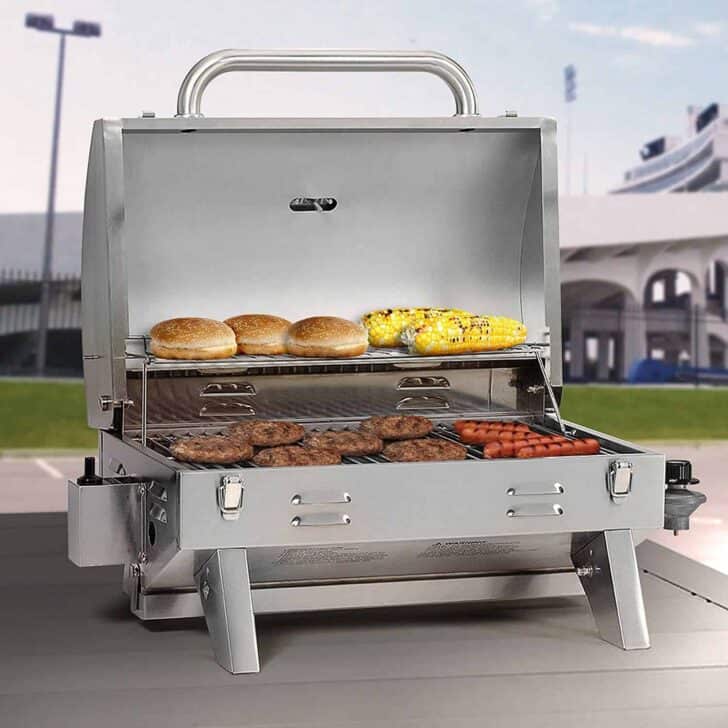
Portable gas grills BTUs
(British Thermal Units): indicate the output of gas that’ll heat your grill. The BTU rating is the maximum amount of heat available for the barbecue. Note – grills with 2 or more burners list BTUs per burner. High BTUs can mean a faster heat-up time, higher temps during cooking, and quicker recovery of temperature when you open the lid or add more food.
- WHAT TO WATCH FOR: not all models are the same. If the unit is made of thin materials that let the heat dissipate quickly, you won’t get as much BTU for the buck – meaning you’d need more BTUs on an inefficient unit compared to lower BTUs on a higher-quality grill to cook a steak in the same amount of time.
- Sometimes very high BTUs can mean that the manufacturer is compensating for lighter materials. Read the reviews carefully!
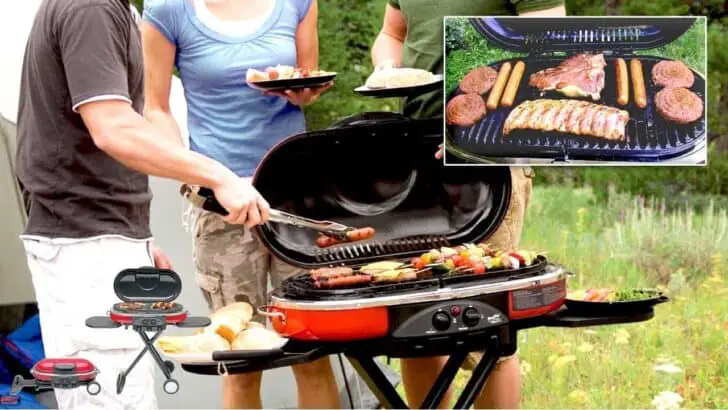
Portable gas grills cooking area
This is simple. Smaller surfaces will only accommodate a few burger patties. Larger areas will allow you to cook more burgers or the flexibility to cook your entire meal on the grate. If it’s just for one or two, why pay for all that extra space that you’ll have to use resources to heat up? But, if you like to tailgate, consider what you want to cook, and how many people you cook for.
- Perspective: a 200-sq-in. cooking surface can hold up to 12 burger patties with space in between. If you’re cooking a meal, such as a steak, a baked, potato, and corn on the cob, plan on about 100 sq. in. per person is a great way to estimate the size of the grill you’ll need.
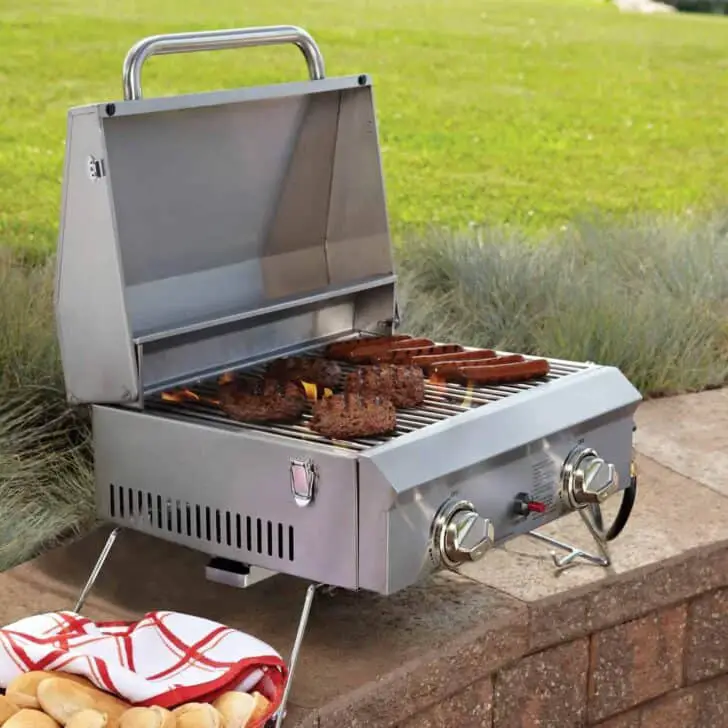
Do the Top Portable Gas Grills have those gleaming grates?
Grates
This is a feature that always catches eyes. That vast expanse of shiny metal makes visions of ribs and steaks dance before your eyes. If you want a lightweight and easy to clean grill, choose stainless steel grates. If you desire those mouth-watering grill-marks and an all-around durable, heat-retaining grill, then go with cast iron – including porcelain-coated varieties. Eventually, all grates will rust, so clean them thoroughly, let dry, and lightly spritz with cooking spray on both sides to protect.
Burners (only for portable gas grills)
Stainless steel has excellent longevity. Aluminum will eventually burn up, and cast iron burners eventually rust. Stainless resists corrosion the best.
- One interesting feature to notice is the warranty on the burner. If you’re looking for longevity, watch those warranties offered by the manufacturers. Some are as short as 90 days; others are 3 or more years on the burners.
Ignition
Most grills, including portable ones (gas models), come with some onboard method to light the fire. Some run on a battery, while others use a push-button or a dial to generate a spark. No matter the manner, when you’re traveling with your grill, plan on a backup, such as a simple candle lighter or those long wooden fireplace matches.
I want the lightest of the portable gas grills, right?
Construction quality
If weight is your primary consideration, see the grill in person first. Push on a couple of corners and see if it flexes. Look for stability too – is it stable on the legs it sits on? How is it constructed? Is it welded or just nuts, bolts, and cotter pins?
Safety is important.You want a stable, durable unit that doesn’t have a lot of cheap hardware that’ll fail quickly and sharp edges to cut you when you’re packing it up.
- Eventually thinner materials discolor with use. The thinner the metal, the quicker it’ll discolor. A thin metal may cause the paint/coating to peel.
- With cast iron, it’ll rust if not properly maintained. If the porcelain coating or paint chips off, you’ll need to either repaint it or lightly oil the bare metal surfaces to prevent rust.
- If it has a rolling cart, an accessories cart, side tables, or similar, be sure you feel they’re stable, sturdy, and well-built enough to last a few years. Don’t forget to check hinges, handles, and other hardware!
Is it portable?
That’s another one for you to decide. Here are considerations:
- Do the hinged parts, doors, legs, and grates latch down for safe traveling?
- Does it have to sit flat or does it have to be stored up on one end (meaning you may have to do a thorough cleaning before you move, so no grease drips in your vehicle)?
- Do you NEED a model on wheels?
- Does the model you like need two people to set it up or move it?
- Will the folded-down size fit into your trunk or storage space on your RV?
Fuel source
For propane or natural gas, you can use a 1-lb pre-filled canister for lightweight transportation. Or, you can use those traditional 20-lb bottles that you see with home grills and strapped to the front or back of RVs and campers. Keep in mind that although the grill may state that it is propane, it is probably set up for the small bottles. Plan on purchasing an adapter valve to accommodate the 20-lb containers. Some conversion kits cost $100 or more, so be sure you’re aware of that BEFORE buying.
- For the other types, you have to plan and be sure you have enough charcoal, wood, or wood pellets – or have them available nearby where you’re camping to cook your meal.
Assembly
Is the grill ready to go right out of the box, or do you have to do a partial to complete assembly? Some only need the handles installed, while others were listed as “difficult” to assemble. If you’re not handy, keep this factor in mind, or enlist the help of a good friend who can help you.
Where was it made?
This consideration may or may not matter to you. Some want to purchase from their own country, while others are just bargain hunting. This is a personal choice. Our recommendation is to consider warranties and materials used when looking at this factor.
Here are the Top 6 Portable Gas Grills
Three Weber Q Series grill models were popular across many websites, and receive high overall customer ratings on sites like Amazon. The main difference between the three popular models is size and BTU. Therefore, we’re counting these three variations as one of our top 6.
Portable Gas Grills that you may want to check out too
More information on the four main fuel types
Propane & natural gas (hooked up to your home’s natural gas supply)
Propane comes in refillable portable cylinders, as well as small, pre-filled tanks (such as the familiar Coleman tanks), It’s suggested to have a second cylinder/bottle since you can’t readily check a gas gauge like in your car. Nothing kills a party quicker than raw food or trying to find a place to fill your propane tanks on a holiday weekend.
The benefits of Portable Gas Grills include easier cleanup (no ash from coals), convenient temperature regulation with control knobs, and the ease of startup. Many have push-button automatic starters, or you can go “old-school” and use matches or lighters.
But what about safety?
Using portable gas grills is safer than ever according to the Hearth, Patio & Barbecue Association because only cylinders that have a mandatory overfill prevention device (OPD) can be refilled or exchanged for refilled bottles. This means that cylinders are only filled to about 80%. You’re not being shorted or cheated out of a full bottle. This allows expansion room when temperatures rise, so the gas isn’t unintentionally being released into the air, thus reducing accidental fire risks.
Charcoal
Adds a unique taste to any food if correctly lit. If not, no one likes the taste of charcoal lighter fluid. Some of the benefits of charcoal include:
- Readily available in most cities/towns
- Simple and relatively safe to transport
- Some are “instant-light” – where you burn the bag and all (prepared with a quick-lighting agent for your convenience)
- Reasonably budget-friendly, and for intermittent use, you won’t have to store supplies
- Charcoal doesn’t necessarily require lighter fluid. Charcoal chimney starters are a quick and efficient way to start them once you get the hang of it
- Does have more cleanup than gas grills (ash), and you must know how to put the fire out correctly while camping to prevent fires
Can I use electric grills instead of Portable Gas Grills? SURE!
Electric
You don’t have to use Portable Gas Grills. Electric grills can be portable and small enough for your countertop, apartment, or condo, and require no charcoal or gas fuel sources. You need to take the same precautions you would with any electrical appliance. Inspect the cord before use, and unplug when not in use. Don’t use it in the rain, while bathing or swimming, or scuba diving (haha).
Smaller units are perfect for singles or two people, and would naturally be portable. Bring a safe, outdoor extension cord if you’re using one of these little beauties in your RV or at a campground with power. Always route power cords so that no one trips on them and sends those pork chops flying!
Pellets/Wood chunks
Pellets are a hybrid between wood fires and charcoal. They’re gaining in popularity because you can now get them in a variety of flavors, including hickory, mesquite, and oak, thus cooking and adding flavor at the same time. Pellets are energy-efficient and clean-burning and come in a variety of flavors, and don’t require pre-soaking like wood chips. They’re all natural and made from 100% of the wood indicated on the packages. Some pellet grills have a dual-fuel unit that’ll allow you to switch over to gas, which can reach higher temperatures than pellets can.
Hope you know now how to choose the perfect portable gas grill!
Updated on 2024-04-22 - Images from Amazon API. Logos are trademarks of Amazon.com, Inc. or its affiliates. 1001Gardens is a participant in the Amazon Services LLC Associates Program, an affiliate advertising program designed to provide a means for sites to earn advertising fees by advertising and linking to Amazon.com.
